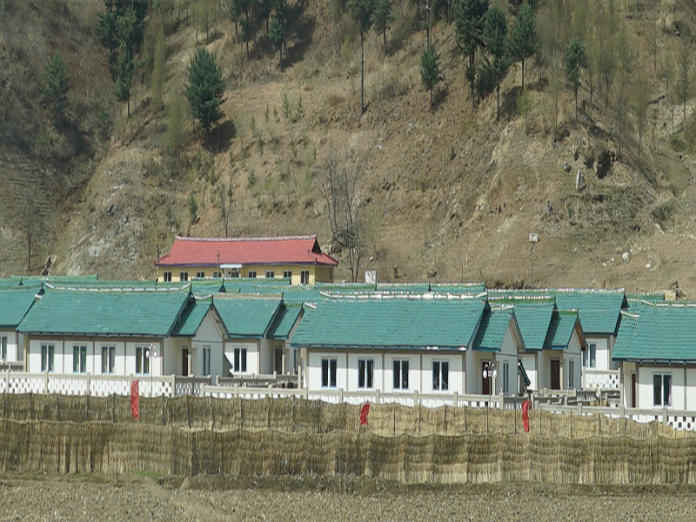
Unification Media Group (UMG): It’s time for another weekly update and we’re speaking with reporter Kang Mi Jin to hear about the newest social and economic trends in North Korea. Mi Jin, can you tell us the latest?
Kang Mi Jin (Kang): The installation of solar panels is becoming so common and widespread in North Korea that it’s even prevalent in the rural regions these days, according to photos and testimony provided by inside informants. Residents are able to heat and cook in their homes without chimneys and charcoal, an indicator of the development that has occurred within the country.
The picture sent by a source shows a rural village on the outskirts of Pyongyang. Although not everyone is able to solve the country’s power shortages through this approach, particular regions have become models in this regard, with residents using the panels to ensure a steady flow of electricity for heating and cooking. The panels are selling well in the markets as a result.
UMG: Can you explain how this region has become a model for using solar panels?
Kang: In North Korea, certain areas are often chosen as demonstration areas for specific businesses or new orders. There are some cases when this has a negative impact, however, these demonstration regions are used as a pilot study preceding a wider spread throughout the country.
By analyzing the photos, we can see that the residences pictured are agricultural homes located alongside the highway. It isn’t possible to tell from the photos, but the solar panels are installed on hilly areas in the village. There, they soak up the sunlight, convert it to electricity, and then send it to the residents to meet their energy needs.
This model is in an agricultural region. It’s likely that the same model will be applied to commercial and other regions as additional test cases before being rolled out more widely throughout the country.
UMG: That’s quite interesting. What is the next development that you have prepared to discuss?
Kang: Recently, trees have been planted within 12 meters of North Korea’s highways in an effort to reforest the country. Next to ordinary roads, the trees are planted in a single line, but next to highways, the entire 12 meter area next to the roads are being filled with trees. This of course applies to empty land not used for agricultural purposes, but it also applies to land used for rice and cornfields. The order has come down, and it’s being implemented.
The problem is that the country’s public distribution system has not been reinstated in all parts of the country. So people in regions where no public distributions are taking place are concerned that the forestation initiative could remove one of their food sources (roadside rice and corn fields). If the international diplomatic situation improves, some residents expect food aid could be in the offing, but if it does not go well, they will continue to worry about their next meal.
Some residents have voiced the opinion that it would be more rational to plant fruit trees alongside the roads. With this consideration in mind, we will have to wait and see what kinds of trees are planted in the future.
UMG: It’s always hard to hear about residents struggling to provide food for themselves. Next, let’s move onto the markets.
Kang: Today, we will look at the current state of self-employed people in the North Korean marketplace. As market activity picks up, the number of people active in the service industry is on the rise. Most of them look for ways to use business strategies and products to improve comfort and convenience.
The service industry is an attractive option for self-employed residents, who look to the marketplace and real estate rentals as a way to get into business. So all sorts of service-providing business people can be seen near the markets and in densely populated regions.
According to information recently gathered from inside sources, many residents with the capital to get started are renting out buildings and going into the taxi business. The residents decide what business to enter based on their capabilities and financial situation.
Most of the services are well developed and the business providers work on maintaining and attracting new customers. Regional cottage industries prepare local favorite foods and drinks using tofu beans, corn meal, and dumplings. This attracts patronage from local residents as well as merchants who are passing through town.
UMG: It looks like capitalist tendencies are helping to improve people’s lives in North Korea. What do you think?
Kang: Yes, even just recently in North Korea, people who were able to save money were subject to investigation by the Ministry of People’s Safety (the police) or other regional legal agencies like the prosecutor’s office. However, nowadays, these agencies no longer ask such residents where they acquired the seed money to enter into business or how they earn their money.
Additionally, some of these agencies are doing more than turn a blind eye to this activity. They demand a cut of the profits. As a result, residents have increasingly pursued capitalism ever since the Arduous March famine struck in the mid 1990s. As specialization has established a firmer foothold in the economy, the market prowess of these residents has become more robust.
Cottage industry operators who use corn or soybeans in their business get linked up to merchants and locations that sell the ingredients wholesale.
There are other relationships as well. The merchants who produce corn powder as a side product link up with alcohol producers to sell the leftover product. Establishing these relationships enables them to reduce waste and increase profits without much extra effort. Because of these networks, cottage industries are becoming an increasingly attractive vocation. This also has the effect of increasing competition and raising the standards of service offered to customers.

















